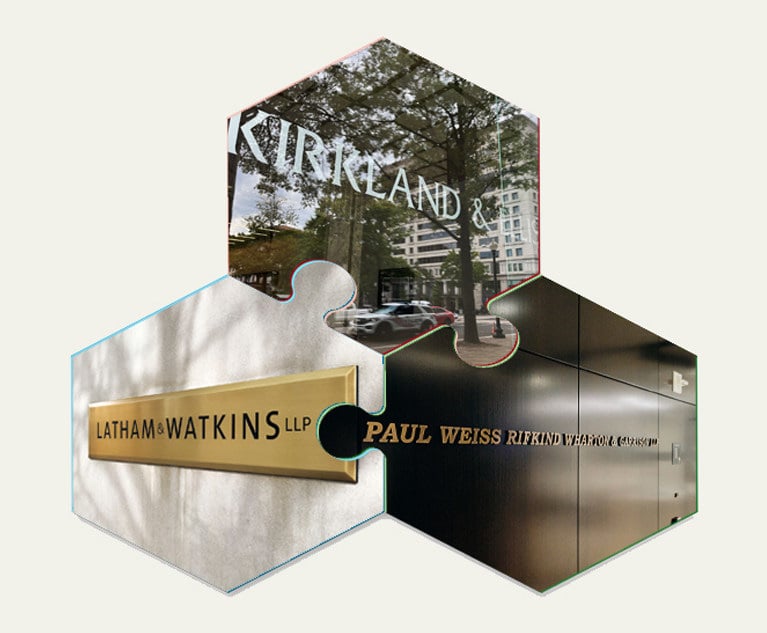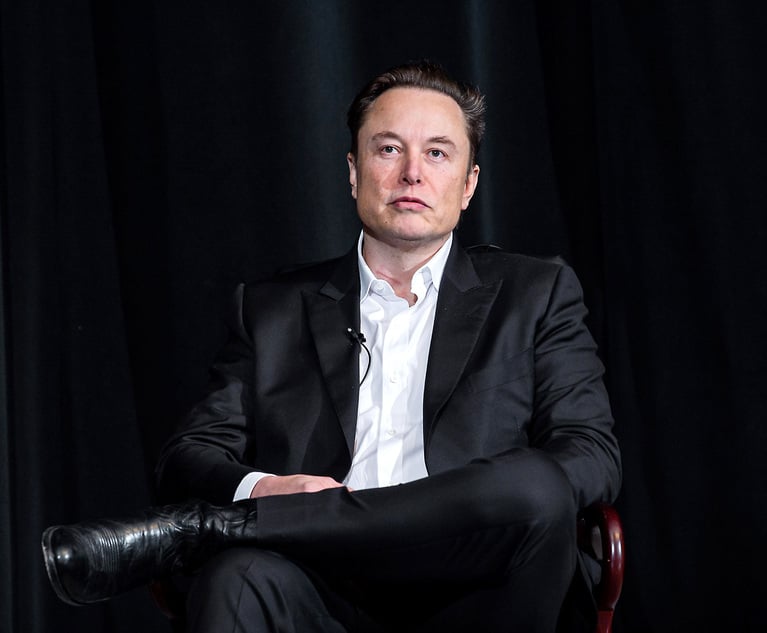Across the generations: The critical need for de-stressing the office
Pinsent Masons director offers four tips to create a more congenial workplace
February 13, 2019 at 04:14 AM
5 minute read
 Oh no, you think, not another article about the damage the older generation is doing to the workplace – are we really that bad? This isn't an attack on those in the legal profession who aren't a Millennial or part of Generation Z. But there's been a lot of discussion recently about how the modern workplace is impacting younger lawyers, and whether it's fit for purpose.
Oh no, you think, not another article about the damage the older generation is doing to the workplace – are we really that bad? This isn't an attack on those in the legal profession who aren't a Millennial or part of Generation Z. But there's been a lot of discussion recently about how the modern workplace is impacting younger lawyers, and whether it's fit for purpose.
The way we work has never been more transparent, nor has there been as much support and awareness of how the workplace affects employees.
In January, findings emerged from LawCare (a charity that offers a helpline service to the legal profession) that showed a majority of calls related to stress, depression and anxiety. Almost half (48%) of those calls were from trainee solicitors.
The charity's chief executive, Elizabeth Rimmer, said: "We remain increasingly concerned about the long hours and heavy workload culture in the law, which significantly affects wellbeing."
Another distressing finding from LawCare was that there were 68 calls last year about bullying and harassment.
It seems clear that more work needs to be done to support lawyers grappling with these challenges and eradicate negative working practices, to improve mental health and wellbeing across the profession. Indeed, many firms are now taking steps to kick-start the cultural shift required to promote change.
The modern legal workplace is experiencing 'teething problems', to put it lightly. However, this isn't to say that progress hasn't been made. At Vario, we speak to lawyers whose lives are being improved every day by flexible working. This modern practice is something that has changed the landscape in recent years.
Even 20 years ago, the legal workplace was drastically different. The use of artificial intelligence was unheard of and the ability to communicate with clients on the go was limited to how much you could do with your Nokia phone.
Nowadays, most lawyers will own and use a smartphone to carry out their work, making it easier to pick up queries and action tasks quicker. Yet the smartphone being treasured as an extension of oneself is making it difficult to switch off from work.
This new form of presenteeism is arguably leaving employees fatigued rather than motivated to get the job done. University of Surrey professor Mark Cropley acknowledges that "this means they can't switch off", adding: "They'll be in bed and their mind will still be on work. They'll go round and round in circles thinking: 'I've got to do this, I've got to do that.' Then they go back to work the next day feeling more fatigued and more likely to make mistakes."
He added: "By unwinding and getting away from the work situation, you become more engaged and energised." Sure, overtime is sometimes necessary to beat the deadline, but working in overdrive on a long-term basis isn't beneficial to the lawyers or their firm. It's no wonder that the expectations around the modern workplace are leaving lawyers feeling stressed, as well as triggering other mental health issues.
You may have spotted there's been an increasing spotlight on how we can create a 'kinder' workplace across all industries. And no, this doesn't just mean opening a door for a colleague, or whispering a gentle 'hello' when you walk into the office. It's about creating a culture where people thrive, feel motivated and supported by their senior management and colleagues – where empathy and compassion rule instead of toxic work practices.
The Mindful Business Charter has recently been set up by three of the biggest banks and nine law firms, including Pinsent Masons, to change avoidable working practices that can cause mental health and wellbeing issues for employees. Those in the alliance have signed up to a set of principles that includes respect for rest periods. But for those law firms not yet on board, there are a number of initiatives they can action now to create a kinder workplace culture:
1. Allow your lawyers to switch off: Your lawyers will come back with fresh ideas and better problem-solving skills if they are allowed breaks throughout the day, as well as time in the evening to relax.
2. Listen to concerns: Create an environment where all lawyers feel supported, rather than judged if they are struggling. Offer more senior members of the team training around how to support a lawyer, and consider joining with a third party to offer counselling to employees.
3. Consider new ways of working: Listen to your lawyers' work needs – maybe they need more flexible working options for caring responsibilities, to work more creatively, pursue a hobby or an entrepreneurial passion project.
4. Hold mindfulness workshops, as well as training around neurolinguistic programming: These initiatives can teach skills and ways of working that can be applied during your day, whether keeping calm under pressure, or handling a problem in a considerate and polite way with other colleagues.
By its very nature, the legal workspace will always be a high-pressure environment. But the ability to switch off from a law firm culture may well create a more cheerful workplace and deliver increased productivity.
Matthew Kay is director at Vario for Pinsent Masons
NOT FOR REPRINT
© 2025 ALM Global, LLC, All Rights Reserved. Request academic re-use from www.copyright.com. All other uses, submit a request to [email protected]. For more information visit Asset & Logo Licensing.
You Might Like
View All
Now That the Trump Era Has Begun, Change Is Coming. For Big Law, Change Is Already Here
6 minute read
The Quiet Revolution: Private Equity’s Calculated Push Into Law Firms
5 minute readTrending Stories
- 1Who Is Nicholas J. Ganjei? His Rise to Top Lawyer
- 2Delaware Supreme Court Names Civil Litigator to Serve as New Chief Disciplinary Counsel
- 3Inside Track: Why Relentless Self-Promoters Need Not Apply for GC Posts
- 4Fresh lawsuit hits Oregon city at the heart of Supreme Court ruling on homeless encampments
- 5Ex-Kline & Specter Associate Drops Lawsuit Against the Firm
Who Got The Work
J. Brugh Lower of Gibbons has entered an appearance for industrial equipment supplier Devco Corporation in a pending trademark infringement lawsuit. The suit, accusing the defendant of selling knock-off Graco products, was filed Dec. 18 in New Jersey District Court by Rivkin Radler on behalf of Graco Inc. and Graco Minnesota. The case, assigned to U.S. District Judge Zahid N. Quraishi, is 3:24-cv-11294, Graco Inc. et al v. Devco Corporation.
Who Got The Work
Rebecca Maller-Stein and Kent A. Yalowitz of Arnold & Porter Kaye Scholer have entered their appearances for Hanaco Venture Capital and its executives, Lior Prosor and David Frankel, in a pending securities lawsuit. The action, filed on Dec. 24 in New York Southern District Court by Zell, Aron & Co. on behalf of Goldeneye Advisors, accuses the defendants of negligently and fraudulently managing the plaintiff's $1 million investment. The case, assigned to U.S. District Judge Vernon S. Broderick, is 1:24-cv-09918, Goldeneye Advisors, LLC v. Hanaco Venture Capital, Ltd. et al.
Who Got The Work
Attorneys from A&O Shearman has stepped in as defense counsel for Toronto-Dominion Bank and other defendants in a pending securities class action. The suit, filed Dec. 11 in New York Southern District Court by Bleichmar Fonti & Auld, accuses the defendants of concealing the bank's 'pervasive' deficiencies in regards to its compliance with the Bank Secrecy Act and the quality of its anti-money laundering controls. The case, assigned to U.S. District Judge Arun Subramanian, is 1:24-cv-09445, Gonzalez v. The Toronto-Dominion Bank et al.
Who Got The Work
Crown Castle International, a Pennsylvania company providing shared communications infrastructure, has turned to Luke D. Wolf of Gordon Rees Scully Mansukhani to fend off a pending breach-of-contract lawsuit. The court action, filed Nov. 25 in Michigan Eastern District Court by Hooper Hathaway PC on behalf of The Town Residences LLC, accuses Crown Castle of failing to transfer approximately $30,000 in utility payments from T-Mobile in breach of a roof-top lease and assignment agreement. The case, assigned to U.S. District Judge Susan K. Declercq, is 2:24-cv-13131, The Town Residences LLC v. T-Mobile US, Inc. et al.
Who Got The Work
Wilfred P. Coronato and Daniel M. Schwartz of McCarter & English have stepped in as defense counsel to Electrolux Home Products Inc. in a pending product liability lawsuit. The court action, filed Nov. 26 in New York Eastern District Court by Poulos Lopiccolo PC and Nagel Rice LLP on behalf of David Stern, alleges that the defendant's refrigerators’ drawers and shelving repeatedly break and fall apart within months after purchase. The case, assigned to U.S. District Judge Joan M. Azrack, is 2:24-cv-08204, Stern v. Electrolux Home Products, Inc.
Featured Firms
Law Offices of Gary Martin Hays & Associates, P.C.
(470) 294-1674
Law Offices of Mark E. Salomone
(857) 444-6468
Smith & Hassler
(713) 739-1250










